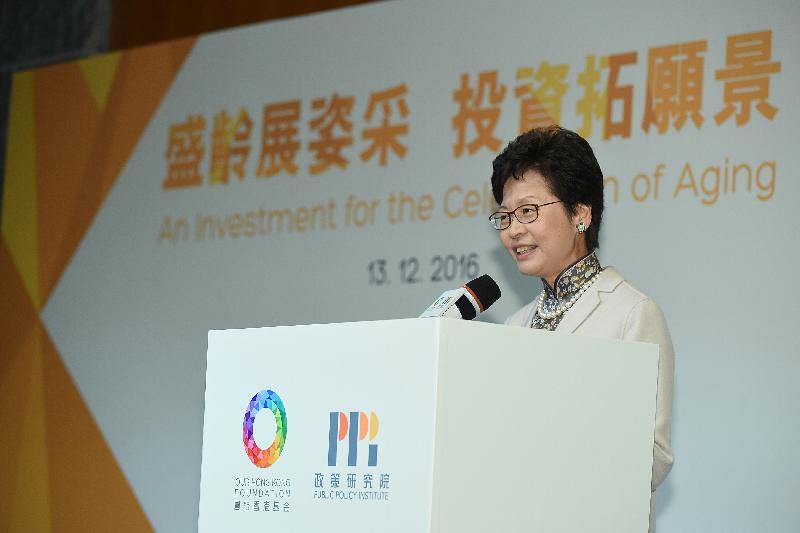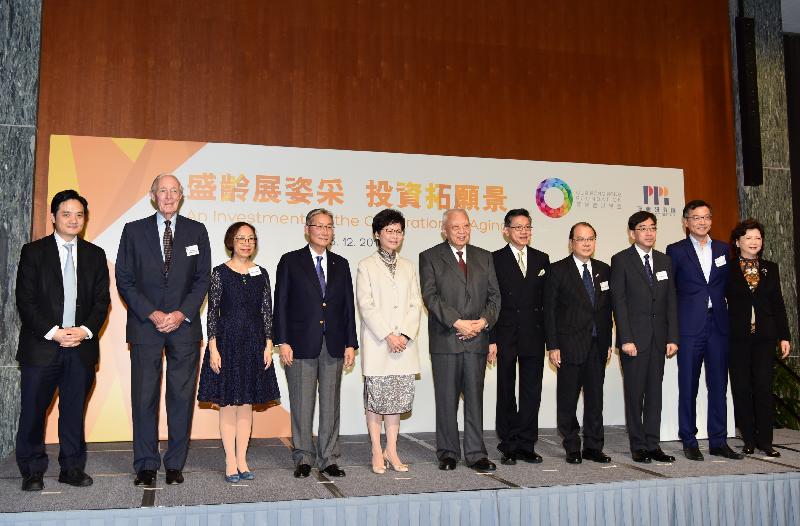Speech by CS at "An Investment for the Celebration of Aging" summit (English only) (with photos/video)
******************************************************************************************
Mr Tung (Chairman of Our Hong Kong Foundation, Mr Tung Chee Hwa), Mrs Tung, Eva (Executive Director of Our Hong Kong Foundation, Mrs Eva Cheng), Professor Yeoh (Director of the Jockey Club School of Public Health and Primary Care of the Chinese University of Hong Kong, Professor Yeoh Eng-kiong), Dr Lam (Chairman of the Elderly Commission, Dr Lam Ching-choi), distinguished guests, ladies and gentlemen,
Good afternoon. It gives me great pleasure to join you today at this Summit on the subject of ageing hosted by Our Hong Kong Foundation. Since its establishment two years ago, Our Hong Kong Foundation has undertaken some serious research in several topical issues ranging from housing to arts innovation, providing very useful reference for the Government in policy formulation. I have no doubt today's research on ageing to be unveiled will shed insightful light on how we may promote the health and well-being of our seniors.
In the beginning of this term of the HKSAR Government, we embarked on an extensive public engagement exercise on Hong Kong's population policy. By now, I think everybody is acutely aware of our major demographic challenge, i.e. Hong Kong is facing a rapidly ageing population. According to projections, the proportion of people aged 65 or above will increase from about 17 per cent in this year to about 30 per cent in less than 20 years' time; the population aged 75 or above will double during that same period, from 550 000 to 1.17 million. While these figures present challenges for the Government and society at large, we should embrace the demographic phenomenon with optimism, drive and commitment. I would therefore first like to commend the research team led by E K for choosing the title of "An Investment for the Celebration of Aging". Yes, ageing should be something to be celebrated and both the Government and society at large must be more forthcoming in investing for that aspiration.
I am pleased to say that this positive stance towards ageing is now enshrined in the Government's recent public consultation documents on Hong Kong 2030+ as well as the Elderly Services Programme Plan. This is, in my view, a marked improvement to previous presentation on ageing in some government publications. For example, in the Report of the Working Group on Long-Term Fiscal Planning released in 2014, it said, "An expanding and ageing population will put pressure on social welfare and health services expenditure. ... With the population ageing, the size of the labour force is set to decline, posing a threat, if not drag, on economic growth and putting pressure on government revenue."
To be fair, the HKSAR Government has for some time been responding proactively to the challenges of an ageing population and committing more resources to supporting our senior citizens. To promote active ageing, we encourage the elderly to commute and travel, visiting grandchildren, going to outlying islands, seeing other parts of Hong Kong, etc. Such improved mobility is made possible by the Government Public Transport Fare Concession Scheme introduced by phases since 2012, or what is now called the "$2 Scheme". Although expenditure to reimburse the public transport companies has grown to over $1 billion this year, we are gratified to see some 858 000 daily trips on average a day made by the elderly under this scheme. Mobility is also enhanced by the Universal Accessibility Programme introduced at the beginning of this term of the Government and the initiatives announced by the Chief Executive in his 2016 Policy Address to develop a more elderly-friendly city with more seats in public areas, more covered walkways, etc.
To unleash the potential of our elderly, the Labour and Welfare Bureau has implemented the Opportunities for the Elderly Project, the Neighbourhood Active Ageing Project and the Elder Academy Scheme to provide relaxing and fulfilling activities to meet the different needs of the elderly. For many senior citizens who had missed the education opportunity while they were young, the Elder Academy Scheme allows them to learn in a school setting, thereby pursuing a healthy and active retirement life through lifelong learning. In the current academic year, there are about 130 Elder Academies in primary, secondary and tertiary institutions throughout the territory.
In my view, age should no longer be a determinant on when one should cease working. The growing trend is for the elderly to remain in the labour force for a longer period. As a matter of fact, the Labour Force Participation Rate for people aged 65 or over has increased from 5.8 per cent in 2006 to 9.4 per cent in 2015. For those who prefer to work on a voluntary basis, the Social Welfare Department (SWD) and many NGOs are recruiting elderly volunteers, with those registered with SWD amounting to over 150 000. Seeing this potential, SWD has launched a two-year pilot project to train grandparents as child carers in home settings. The response was very enthusiastic and all the 540 training places have been taken up very quickly.
Inevitably, the elderly will grow older and become frail. It is the Government's policy to promote "ageing in place, institutional care as backup". This is in response to the aspiration of most elderly people to age in a familiar environment.
With the support of the Elderly Commission, we piloted the concept "money-following-the-user" (钱跟老人走) in the provision of community and residential care. First introduced in 2013, the Community Care Service Voucher for the Elderly Scheme now provides a maximum of 3 000 vouchers while the first phase of the Residential Care Service Voucher for the Elderly will be launched in the first quarter of next year. These schemes have embodied features of co-payment, choice and flexibility. Meanwhile, the Elderly Commission is tasked to formulate an Elderly Services Programme Plan to draw up a blueprint to improve the medium and long-term planning of elderly services. A set of initial recommendations have been made and the public is now being consulted.
In a city like Hong Kong where land and premises are always in great demand, welfare facilities are essential to meeting the needs of the elderly. We introduced the Special Scheme on Privately Owned Sites for Welfare Uses a few years ago. Over 40 NGOs have submitted a total of 63 projects and the proposed facilities to be built include around 9 000 purpose-built residential care places for the elderly. Through a $10 billion injection into the Lotteries Fund, there is no funding shortage to complete all these projects.
Death should no longer be a taboo. For those who are terminally ill, we should aim to provide the most suitable environment for them to spend their final moments. Thus, quality end-of-life care is one important aspect in a research study on healthcare services for the elderly being conducted by the Chinese University of Hong Kong, spearheaded also by Professor E K Yeoh.
While the Government will continue pressing ahead with the foregoing measures, the demographic challenges call for some new thinking. In my view, there are two areas we should put in more attention and efforts.
One is the application of technology to improve the elderly's quality of life. The research and development centres supported by the Innovation and Technology Fund have developed a number of elderly-friendly products, including wearable RFID-tagged vests to help locate the elderly suffering from dementia and a smart guiding cane to provide voice guidance for the visually impaired along tactile paving embedded with RFID tags. We have also provided support for developing free-downloadable mobile apps that provide information on elderly activities organised by some 190 elderly centres as well as cognitive training and emergency assistance for those beset with dementia.
Healthy ageing is one of the three over-arching cross-disciplinary platforms of the Hong Kong Science Park. At present, around 74 of the some 620 technology companies in the Hong Kong Science Park are in the biomedical technology cluster. We will introduce the $500 million Innovation and Technology Fund for Better Living in the second quarter of next year to finance projects that make use of innovative ideas and technologies to improve people's daily life, including those making life more convenient for elderly persons.
Second is enhancing cross-sector and cross-discipline collaboration. Over the years, SWD and numerous NGOs have built up an extensive network of 41 District Elderly Community Centres (DECCs) and 168 Neighbourhood Elderly Centres. With medical support, these centres could readily perform the role to provide community and home care to the elderly, thereby enabling them to remain in the community for as long as ever, while at the same time reducing the pressure on public hospitals. In this respect, I am pleased to report that a pilot Dementia Community Support Scheme funded by the Community Care Fund will be launched early next year through medical-social collaboration to provide suitable care, training and support services to those with dementia and their family at the DECCs.
Based on some overseas experiences, I believe there remains huge potential to be tapped on both scores. To this end, the HKSAR Government is discussing with the Hong Kong Council of Social Service to host a summit next year with the theme "elderly and technology". I am very pleased that this initiative has received the strong support of the Hong Kong Science and Technology Parks Corporation chaired by my former civil service colleague, Fanny Law, and Professor E K Yeoh, my former boss.
Ladies and gentlemen, I have said on many occasions, and I say this again this afternoon, a society will not be a just and compassionate one if it could not take good care of its elderly citizens who have contributed so much to its prosperity. The HKSAR Government is committed to making Hong Kong a just and compassionate society. While we have made considerable progress, much more has to be done. We need the wise counsel from experts in the relevant sectors to help us chart the way forward. I would like to thank Our Hong Kong Foundation and E K for your dedication and contribution.
Thank you very much.
Ends/Tuesday, December 13, 2016
Issued at HKT 18:32
Issued at HKT 18:32
NNNN




